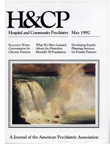Improving Quality Assurance Through Psychiatric Mortality and Morbidity Conferences in a University Hospital
Abstract
To make quality assurance more outcome oriented, the department of psychiatry in a university hospital developed a program of psychiatric mortality and morbidity conferences for reviewing cases with undesirable outcomes. The conference combines aspects of a traditional medical mortality and morbidity conference with features of utilization review and risk management. Case review is focused on mortality, morbidity, or specific indicators developed by the departmental services involved and on a determination of whether an adverse outcome was avoidable, possibly avoidable, or unavoidable. The authors summarize the 100 cases reviewed in the first seven months. They believe the focus on outcome gives the method a useful role in quality assurance; advantages include its recognizable contributions to continuing education and training.
Access content
To read the fulltext, please use one of the options below to sign in or purchase access.- Personal login
- Institutional Login
- Sign in via OpenAthens
- Register for access
-
Please login/register if you wish to pair your device and check access availability.
Not a subscriber?
PsychiatryOnline subscription options offer access to the DSM-5 library, books, journals, CME, and patient resources. This all-in-one virtual library provides psychiatrists and mental health professionals with key resources for diagnosis, treatment, research, and professional development.
Need more help? PsychiatryOnline Customer Service may be reached by emailing [email protected] or by calling 800-368-5777 (in the U.S.) or 703-907-7322 (outside the U.S.).



